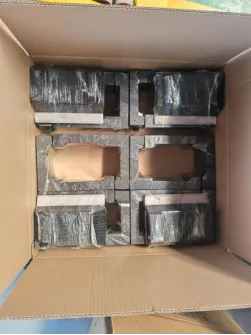metal cable carrier
Exploring the Benefits and Applications of Metal Cable Carriers
In today's fast-paced industrial environment, efficient management of cables and wires is crucial for both operational safety and performance. Metal cable carriers, also known as cable chains or drag chains, have emerged as a reliable solution for organizing and protecting cables, hoses, and other flexible connections in various machinery and automation systems. This article delves into the advantages of metal cable carriers and their diverse applications across different sectors.
What are Metal Cable Carriers?
Metal cable carriers are structures designed to support and guide cables and hoses in motion. Typically constructed from durable materials such as steel or aluminum, these carriers protect enclosed cables from wear and tear while allowing them to move freely in a controlled manner. Unlike their plastic counterparts, metal cable carriers offer enhanced strength, resistance to high temperatures, and protection against various environmental factors, making them ideal for demanding applications.
Advantages of Metal Cable Carriers
1. Durability and Strength One of the primary benefits of metal cable carriers is their ability to withstand heavy loads and harsh conditions. The robust construction ensures they can handle significant tensile forces, making them suitable for heavy machinery and outdoor applications where durability is a must.
2. Temperature Resistance Metal cable carriers can operate effectively in a wide range of temperatures, from extreme cold to high heat. This characteristic makes them ideal for industries such as automotive, aerospace, and manufacturing, where equipment is often exposed to fluctuating temperatures.
3. Safety and Protection By housing and organizing cables within a metal carrier, the risk of cable wear and damage is minimized. This not only prolongs the lifespan of the cables but also enhances safety by reducing the chances of electrical hazards, short circuits, or equipment malfunctions.
4. Versatility Metal cable carriers are available in various sizes, shapes, and styles, making them suitable for numerous applications. They can be used in vertical, horizontal, or inclined setups, providing flexibility in design and implementation. Their adaptability allows for use in environments as diverse as factories, warehouses, and even robotics applications.
metal cable carrier

5. Ease of Maintenance Maintenance is simplified with metal cable carriers, as they often come with easy access to cables and hoses. This design minimizes downtime during repairs or replacements, which is crucial for maintaining productivity in industrial settings.
Applications of Metal Cable Carriers
1. Manufacturing In manufacturing facilities, metal cable carriers serve a critical role in organizing power and data cables for automated machinery. They ensure smooth operation while reducing the risk of equipment failure due to tangled or damaged wires.
2. Robotics In the field of robotics, cable carriers are indispensable for guiding the myriad of wires and hoses that are integral to robots' functionality. They enable multi-axis movement, allowing robots to operate efficiently and safely in various industrial applications.
3. Automotive Sector The automotive industry utilizes metal cable carriers in assembly lines and robotic workstations. By providing cable support and protection, they help ensure uninterrupted production processes that comply with stringent safety standards.
4. Construction and Heavy Machinery In the construction sector, heavy machinery often operates in rugged environments. Metal cable carriers protect crucial cables from damage caused by debris, heavy impacts, or exposure to adverse conditions.
5. Aerospace Aerospace applications demand not only strength and durability but also compliance with stringent safety regulations. Metal cable carriers provide a reliable solution for managing cables in aircraft and spacecraft, where failures can have catastrophic consequences.
Conclusion
As industries continue to evolve, the demand for efficient cable management solutions like metal cable carriers becomes increasingly important. Their durability, temperature resistance, versatility, and safety features make them an ideal choice for various applications ranging from manufacturing to aerospace. By investing in quality metal cable carriers, companies can enhance their operational efficiency, ensure equipment safety, and ultimately drive productivity forward in a competitive landscape. The future of industrial cable management is undoubtedly anchored in the resilience and reliability of metal cable carriers.








